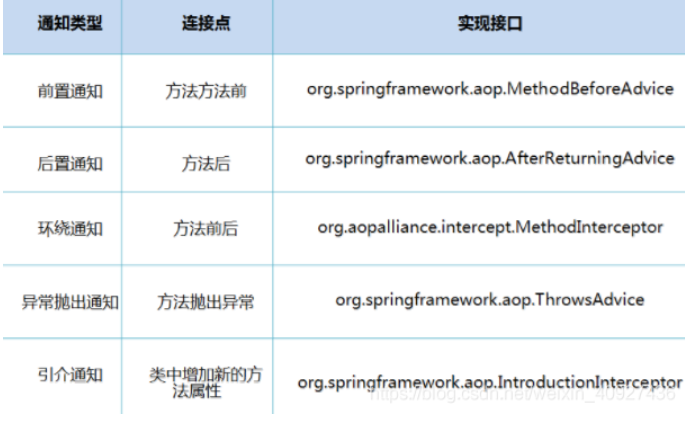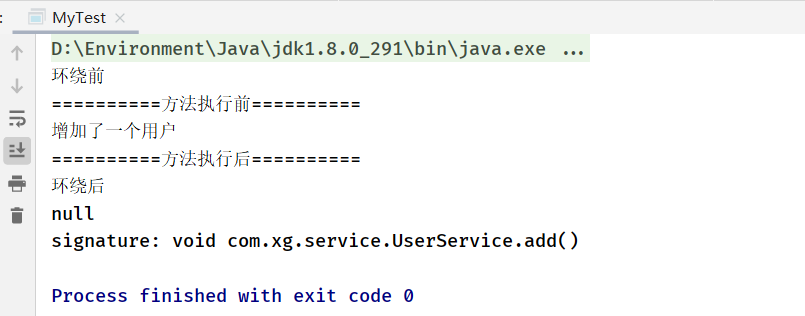1、什么是AOP
AOP为Aspect Oriented Programming的缩写,意为:面向切面编程,通过预编译方式和运行期间动态代理实现程序功能的统一维护的一种技术。AOP是OOP的延续,是软件开发中的一个热点,也是Spring框架中的一个重要内容,是函数式编程的一种衍生范型。利用AOP可以对业务逻辑的各个部分进行隔离,从而使得业务逻辑各部分之间的耦合度降低,提高程序的可重用性,同时提高了开发的效率。
2、AOP 在Spring中的作用
提供声明式事务:允许用户自定义切面:
- 横切关注点: 跨越应用程序多个模块的方法或功能.既是,与我们业务逻辑无关,但是我们需要关注的部分,就是横切关注点 .如日志,安全,缓存,事务等…
- 切面(ASPECT):横切关注点 被模块化 的特殊对象。即,它是一个类。
- 通知(Advice):切面必须要完成的工作。即,它是类中的一个方法。
- 目标(Target):被通知对象。
- 代理(Proxy):向目标对象应用通知之后创建的对象。
- 切入点(PointCut):切面通知 执行的 “地点”的定义。
- 连接点(JointPoint):与切入点匹配的执行点。
Aop 在 不改变原有代码的情况下 , 去增加新的功能。
SpringAOP中,通过Advice定义横切逻辑,Spring中支持5种类型的Advice:

3、使用Spring 实现AOP
使用AOP 的前提 导aspectjweaver包
<dependency>
<groupId>org.aspectj</groupId>
<artifactId>aspectjweaver</artifactId>
<version>1.9.6</version>
</dependency>
3.1、搭建环境
UserService
package com.xg.service;
public interface UserService {
public void add();
public void delete();
public void update();
public void select();
}
UserServiceImpl
package com.xg.service;
public class UserServiceImpl implements UserService {
@Override
public void add() {
System.out.println("增加了一个用户");
}
@Override
public void delete() {
System.out.println("删除了一个用户");
}
@Override
public void update() {
System.out.println("修改了一个用户");
}
@Override
public void select() {
System.out.println("查询了一个用户");
}
}
3.2、方式一:使用Spring的API接口
配置Aop : 需要导入Aop 的约束
Log
package com.xg.log;
import org.springframework.aop.MethodBeforeAdvice;
import java.lang.reflect.Method;
public class Log implements MethodBeforeAdvice {
// method : 要执行的目标对象方法
// args : 参数
// target : 目标对象
@Override
public void before(Method method, Object[] args, Object target) throws Throwable {
System.out.println("[DEBUG]" + target.getClass().getName() + "的" + method.getName() + "方法被执行了");
}
}
AfterLog
package com.xg.log;
import org.springframework.aop.AfterReturningAdvice;
import java.lang.reflect.Method;
//AfterAdvice
//AfterReturningAdvice
public class AfterLog implements AfterReturningAdvice {
@Override
public void afterReturning(Object returnValue, Method method, Object[] args, Object target) throws Throwable {
System.out.println("执行了" + method.getName() + "方法,返回结果为:" + returnValue);
}
}
applicationContext.xml
<?xml version="1.0" encoding="UTF-8"?>
<beans xmlns="http://www.springframework.org/schema/beans"
xmlns:xsi="http://www.w3.org/2001/XMLSchema-instance"
xmlns:aop="http://www.springframework.org/schema/aop"
xsi:schemaLocation="http://www.springframework.org/schema/beans
http://www.springframework.org/schema/beans/spring-beans.xsd
http://www.springframework.org/schema/aop
http://www.springframework.org/schema/aop/spring-aop.xsd">
<!--注册bean-->
<bean id="userService" class="com.xg.service.UserServiceImpl"/>
<bean id="log" class="com.xg.log.Log"/>
<bean id="afterLog" class="com.xg.log.AfterLog"/>
<!--配置Aop : 需要导入Aop 的约束-->
<aop:config>
<!-- 切入点-->
<aop:pointcut id="pointcut" expression="execution(* com.xg.service.UserServiceImpl.*(..))"/>
<!-- 执行环绕对象-->
<aop:advisor advice-ref="log" pointcut-ref="pointcut"/>
<aop:advisor advice-ref="afterLog" pointcut-ref="pointcut"/>
</aop:config>
</beans>
测试类
import com.xg.service.UserService;
import org.springframework.context.ApplicationContext;
import org.springframework.context.support.ClassPathXmlApplicationContext;
public class MyTest {
public static void main(String[] args) {
ApplicationContext context = new ClassPathXmlApplicationContext("applicationContext.xml");
// 注意点 : 动态代理的是接口
UserService userService = context.getBean("userService", UserService.class);
userService.add();
}
}

3.3、方式二:使用自定义类实现AOP
DiyPointCut
package com.xg.diy;
public class DiyPointCut {
public void before() {
System.out.println("==========方法执行前==========");
}
public void after() {
System.out.println("==========方法执行后==========");
}
}
applicationContext.xml
<?xml version="1.0" encoding="UTF-8"?>
<beans xmlns="http://www.springframework.org/schema/beans"
xmlns:xsi="http://www.w3.org/2001/XMLSchema-instance"
xmlns:aop="http://www.springframework.org/schema/aop"
xsi:schemaLocation="http://www.springframework.org/schema/beans
http://www.springframework.org/schema/beans/spring-beans.xsd
http://www.springframework.org/schema/aop
http://www.springframework.org/schema/aop/spring-aop.xsd">
<!--注册bean-->
<bean id="userService" class="com.xg.service.UserServiceImpl"/>
<bean id="log" class="com.xg.log.Log"/>
<bean id="afterLog" class="com.xg.log.AfterLog"/>
<bean id="diy" class="com.xg.diy.DiyPointCut"/>
<aop:config>
<!-- 自定义切面-->
<aop:aspect ref="diy">
<aop:pointcut id="pointcut" expression="execution(* com.xg.service.UserServiceImpl.*(..))"/>
<aop:before method="before" pointcut-ref="pointcut"/>
<aop:after method="after" pointcut-ref="pointcut"/>
</aop:aspect>
</aop:config>
</beans>
测试类
import com.xg.service.UserService;
import org.springframework.context.ApplicationContext;
import org.springframework.context.support.ClassPathXmlApplicationContext;
public class MyTest {
public static void main(String[] args) {
ApplicationContext context = new ClassPathXmlApplicationContext("applicationContext.xml");
// 注意点 : 动态代理的是接口
UserService userService = context.getBean("userService", UserService.class);
userService.add();
}
}

3.4、方式三:使用注解实现
AnnotationPointCut
package com.xg.diy;
import org.aspectj.lang.ProceedingJoinPoint;
import org.aspectj.lang.Signature;
import org.aspectj.lang.annotation.After;
import org.aspectj.lang.annotation.Around;
import org.aspectj.lang.annotation.Aspect;
import org.aspectj.lang.annotation.Before;
@Aspect // 标志这个类是一个切面
public class AnnotationPointCut {
@Before("execution(* com.xg.service.UserServiceImpl.*(..))")
public void before() {
System.out.println("==========方法执行前==========");
}
@After("execution(* com.xg.service.UserServiceImpl.*(..))")
public void after() {
System.out.println("==========方法执行后==========");
}
// 在环绕增强中,可以给定一个参数,代表获取切入的点
@Around("execution(* com.xg.service.UserServiceImpl.*(..))")
public void around(ProceedingJoinPoint joinPoint) throws Throwable {
System.out.println("环绕前");
// 执行方法
Object proceed = joinPoint.proceed();
System.out.println("环绕后");
System.out.println(proceed);
Signature signature = joinPoint.getSignature();
System.out.println("signature: " + signature);// 获得签名
}
}
applicationContext.xml
<?xml version="1.0" encoding="UTF-8"?>
<beans xmlns="http://www.springframework.org/schema/beans"
xmlns:xsi="http://www.w3.org/2001/XMLSchema-instance"
xmlns:aop="http://www.springframework.org/schema/aop"
xsi:schemaLocation="http://www.springframework.org/schema/beans
http://www.springframework.org/schema/beans/spring-beans.xsd
http://www.springframework.org/schema/aop
http://www.springframework.org/schema/aop/spring-aop.xsd">
<!--注册bean-->
<bean id="userService" class="com.xg.service.UserServiceImpl"/>
<bean id="log" class="com.xg.log.Log"/>
<bean id="afterLog" class="com.xg.log.AfterLog"/>
<bean id="annotationPointCut" class="com.xg.diy.AnnotationPointCut"/>
<!-- 开启注解支持 -->
<!-- JDK(默认 expose-proxy="false" ) cglib(expose-proxy="true")-->
<aop:aspectj-autoproxy/>
</beans>
测试类
import com.xg.service.UserService;
import org.springframework.context.ApplicationContext;
import org.springframework.context.support.ClassPathXmlApplicationContext;
public class MyTest {
public static void main(String[] args) {
ApplicationContext context = new ClassPathXmlApplicationContext("applicationContext.xml");
// 注意点 : 动态代理的是接口
UserService userService = context.getBean("userService", UserService.class);
userService.add();
}
}
